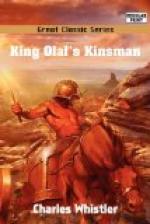Eadmund waxed restless. There was the best half of a long summer day before us, and our men were angry and full of longing to fight and take revenge. I think there was not one that did not know all that might hang on this battle.
“Redwald,” the king said, “is there no way by which we might cross the river? Then might we fall on the ships at Burnham, and Cnut must send his men over ship by ship, and so we might well gain the victory.”
I looked at the tide, and called for some Essex men who knew the place, and one came and told me that in two hours’ time we might cross at a ford higher up, which they name Hull bridge, though there is no bridge there. And when he heard that, at once our king set his men in order and cheered them with fresh hopes, and we started to march thither.
And at the same time Cnut’s ships began to move, and from Burnham and from this shore his men were coming up on the tide towards the very place where we would cross, and before the ford could be passed by us we knew that they would be there in force.
“So,” said Eadmund quietly, “they are before us. We will even go back to the hill.”
We went back, and then I think that we knew the worst. We were hemmed in upon it, for the half of the Danish force that had remained were barring our way inland, while from the river every other man of the Danish host was coming up to attack us from that side.
“Now it would seem that some of us will stay on this hill for good,” said Eadmund; “but if we must lie here till the last day it is a place whence one can look out over the English land and sea and river for which we have died.”
And so he drew us up in the ring again there on the hilltop, which was wide enough, and we sat down and waited for the coming of the Danes.
“Lord king,” I said, “let us make a wedge and cut through the Danes inland. So shall we win back to the open country, and we can gather men afresh.”
He smiled wearily at me, and it seemed to me that at last he had given up hope. And but for Streone’s treachery that thing would never have been. It had broken our king’s spirit.
“Friend,” he said, “I will die here if I can.”
“That shall not be while there is one to give his life for you,” I answered, and the thanes around us murmured “Aye!” in that stern voice that means more than aught of clamour.
Then I saw some Wessex thanes speaking earnestly to one another, and presently they beckoned to me, and while Eadmund sat silent on his horse I went to them to hear what they would.
“We will get the king off this field if we can,” they said. “We cannot lose him. If chance is, we will take him against his will. Hinder us not.”
“That is well,” said I. “I will help you, for he is the hope of England.”
Maybe Ashingdon hilltop is full fifty acres in the more level summit, and we could not guard it all; so we waited on that edge nearest the Danes, the half circle that faces inland from the marshes towards the battle ground we had lost, and to Hockley from the river. And presently the Danes began to come up the hill in even line, and we watched them drawing nearer in silence.




